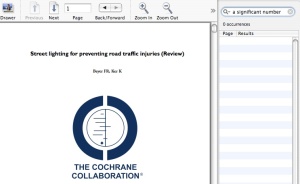Posts Tagged ‘Research’
Government appointed campaigners
Sara Payne, the mother of murderd girl Sarah Payne, has been nominated the Government’s new Victims’ Champion and Richard Taylor, the father of murdered teenager Damilola Taylor, has been given the role of Government special envoy on youth violence and knife crime. Since when has the government decided that the people most qualified to tackle societal problems are indirect victims of said problems? I would never deny these people the right to campaign on issues which they feel strongly about, but elevating them to fairly high, even if purely symbolic, governmental posts is not the way to go.
No doubt, they will ‘visit people up and down the country to see what more can be done to make sure that the voice of the victim is heard’ but how do we know that the people they speak to are actually representative of the country as a whole? The people who turn up to their meetings will, most probably be sympathisers with their cause. This may well be good for their campaign but when we turn them into government sanctioned gatekeepers we give their cause an extra level of influence, most probably at the expense of other groups. Sara Payne has already positioned herself and her official post in opposition to offender’s rights by saying ‘Criminals have plenty of groups to stand up for their rights’. She obviously does not appreciate that offender’s rights and victim’s rights is not a zero-sum game- they do not, cannot and should not balance.
In the words of the New Generation Network we need to ‘wrest the debate away from the extreme ends of the spectrum and provide a voice to the silent majority’. By appointing one person to go and talk to people who already feel similarly (and if you don’t believe me, take a look at the Damilola Taylor Trust’s website or The People’s March facebook group and try and find) we will not acheive anything. The government needs to continue to support impartial and neutral people to do research into why violent crime is increasing amongst young people in the UK (if it even is), taking into account all the knowledge we have accumulated about sub-cultures, desistance and the age-crime curve, public opinion and the media. Only then will we be able to improve the situation both in terms of policy formation and reduction in crime.
Switching off street lamps ‘could triple road deaths’ | Mail Online
The Daily Mail has reported that Switching off street lamps ‘could triple road deaths’. As ever, I was sceptical from the outset so I decided to actually download the report which is available here . Firstly, just to clarify, the report is a meta-analysis of studies done by other people. The Cochrane Collaboration is vigorous in its selection criteria for including studies in their meta-analyses- even so there are methodological issues within the original studies. The first thing that struck me was this quote (page 2):
Authors’ conclusions
The results from this systematic review suggests that street lighting may prevent road traffic crashes, injuries and fatalities. However, further well designed studies are needed to determine the effectiveness of street lighting in middle and low-income countries.
This doesn’t quite concur with the Mail’s statement that:
Researchers say there is overwhelming evidence that street lamps save the lives of ‘a significant number’ of pedestrians, cyclists and motorists each year.
The report does not argue this and even if it did, there are numerous other major methodogical issues with the whole project which could undermine the results.
- ‘the methodological quality of the trials was generally poor’ (page 1).
- The research did not compare the number of fatal crashes with an area control (page 1) so we do not actually know if turning the lights off will increase the number of fatalities.
- The risk of bias in these studies was judged to be high.
- 11 of the studies used day time figures as a control so we are not actually comparing ‘night time no lights’ with ‘night time with lights’.
- The other 5 studies used a seperate area as a control unit so we are actually comparing this area, with street lights, with another (and crucially different area) that has no street lights. to 10.03). Only one study with an area control specified an intention to match the control roads by speed limit, road type and police district
- There were no randomised control trials in the analysis
- None of the included studies had a data collection period of less than 12 months for either the before (range 1-3 years) or the after (range 1-8 years) periods,
I’m not going to continue, I think I’ve made my point. I am not criticising the meta-analysis itself- the authors are explicit in the poor quality of the whole exercise. The issue, as if it’s not obvious, is the media reporting of it. You will notice that that most of the first quotes in this post come from pages 1 and 2 of the report (ironically, page 2 is the ‘Plain Language Sumamary’). The Daily Mail author obviously didn’t get that far.
Note the quotation marks in the quote from the Mail above- ‘a significant number’. I think they must have fabricated that quote. If one searches for it in the report, it comes up with 0 (zero) occurrences. Look:

Not only has the Daily Mail not read the report but they’re making things up as well! Amazing!